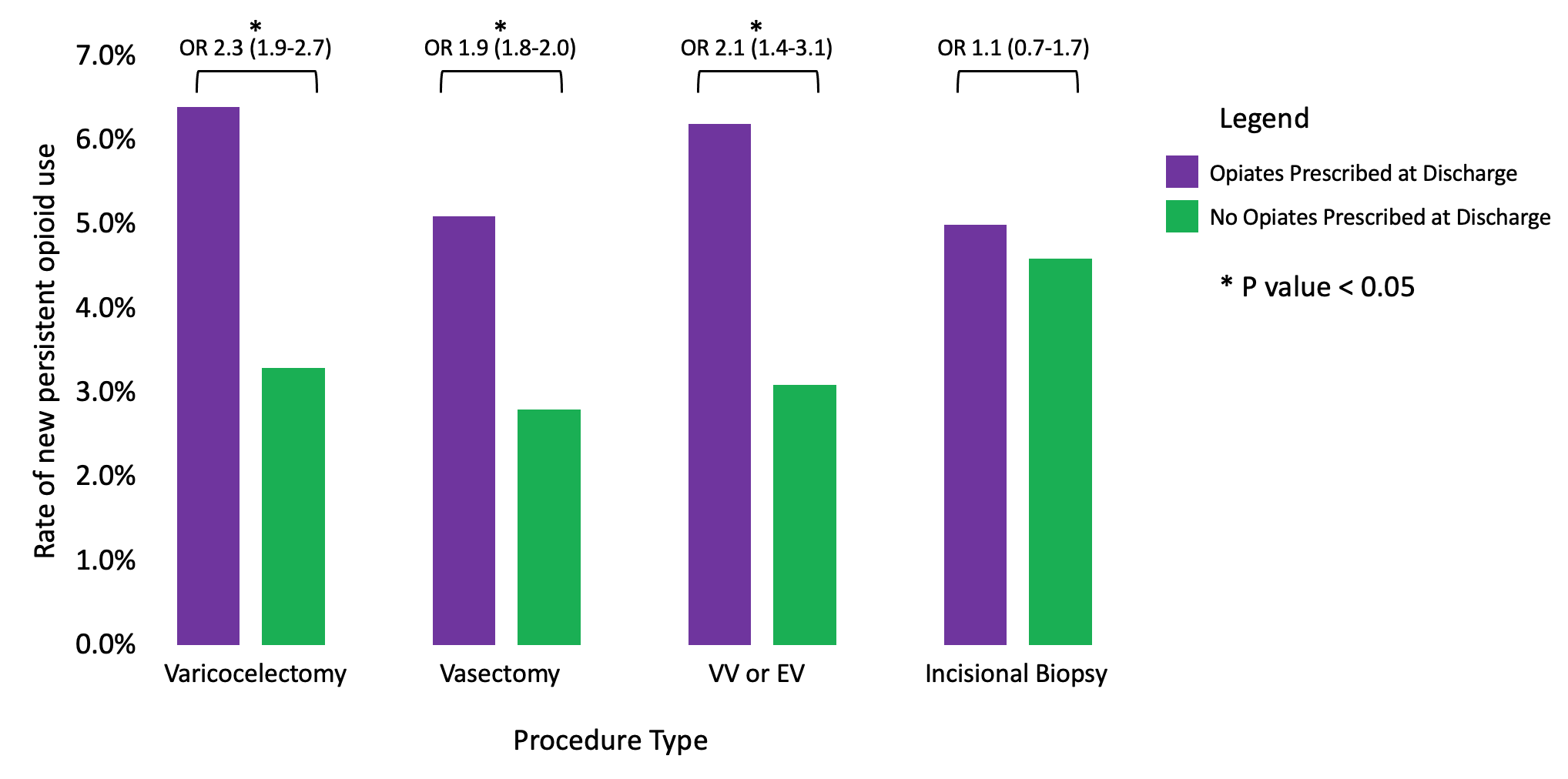Back
Poster, Podium & Video Sessions
Best Poster Award
MP34: Infertility: Therapy
MP34-02: Opioid Prescribing Following Male Infertility Surgery is Associated with Persistent Opioid Use - Analysis of a U.S. Claims Database
Saturday, May 14, 2022
4:30 PM – 5:45 PM
Location: Room 225
Corey Able*, Galveston, TX, Andrew T Gabrielson, Baltimore, MD, Christopher Meilchen, Galveston, TX, Jaden R Kohn, Taylor P Kohn, Baltimore, MD

Corey Austin Able, BS
University of Texas Medical Branch
Poster Presenter(s)
Introduction: Multiple studies have described new persistent opioid use when opioids are prescribed after minor surgical procedures. Our objective was to assess risk of new persistent opioid use after male infertility procedures.
Methods: We queried the TriNetX Diamond network database, a health research network including 190 million patients, including healthcare encounters, and prescribing data between 2009-2021. Men between 20-70 years of age undergoing varicocelectomy (CPT 55530), vasectomy (55250), vasovasostomy (VV; 55400) or epididymovasostomy (EV; 54900, 54901), or incisional biopsy of testicle excluding microsurgical technique (54505 excluding 69990) were included for analysis. Men who were prescribed an opioid prescription within 3 months prior to the procedure were excluded. Post-operative opioid prescription was defined as opioid prescribed on the day of or up to 5 days after the procedure. New persistent opioid use was defined as a prescription for opioid pain medication between 9 to 15 months after index procedure, in line with previously published criteria assessing new persistent opioid use.
Results: A total of 374,416 men were included. Data are described by procedure:
13,222 men underwent varicocelectomy; 28.3% were prescribed opioids within the first 5 days and were at increased risk of new persistent opioid use at 9 to 15 months compared to those without an initial opioid prescription (6.4% vs 3.3%; OR 2.3, 95% CI 1.9-2.7).
356,461 men underwent vasectomy; 19.0% received an initial opioid prescription and were more likely to have new persistent opioid use (5.1% vs 2.8%, OR 1.9, 95% CI 1.8-2.0).
2,354 men underwent VV or EV; 27% received an initial opioid prescription and were more likely to have new persistent opioid use (6.2% vs 3.1%, OR 2.1, 95%CI 1.4-3.1).
Finally, 2,379 men underwent incisional biopsy of the testicle; 21.9% received an initial opioid prescription. New persistent opioid use was similar in both groups (5.0% vs 4.6%, OR 1.1, 95% CI 0.7-1.7).
Conclusions: Prescription of opioids for common male infertility procedures was associated with a roughly two-fold increased odds of new persistent opioid use in the future. A combination of preoperative counseling and judicious prescribing on the part of surgeons may be an important means of mitigating this risk.
Source of Funding: None

Methods: We queried the TriNetX Diamond network database, a health research network including 190 million patients, including healthcare encounters, and prescribing data between 2009-2021. Men between 20-70 years of age undergoing varicocelectomy (CPT 55530), vasectomy (55250), vasovasostomy (VV; 55400) or epididymovasostomy (EV; 54900, 54901), or incisional biopsy of testicle excluding microsurgical technique (54505 excluding 69990) were included for analysis. Men who were prescribed an opioid prescription within 3 months prior to the procedure were excluded. Post-operative opioid prescription was defined as opioid prescribed on the day of or up to 5 days after the procedure. New persistent opioid use was defined as a prescription for opioid pain medication between 9 to 15 months after index procedure, in line with previously published criteria assessing new persistent opioid use.
Results: A total of 374,416 men were included. Data are described by procedure:
13,222 men underwent varicocelectomy; 28.3% were prescribed opioids within the first 5 days and were at increased risk of new persistent opioid use at 9 to 15 months compared to those without an initial opioid prescription (6.4% vs 3.3%; OR 2.3, 95% CI 1.9-2.7).
356,461 men underwent vasectomy; 19.0% received an initial opioid prescription and were more likely to have new persistent opioid use (5.1% vs 2.8%, OR 1.9, 95% CI 1.8-2.0).
2,354 men underwent VV or EV; 27% received an initial opioid prescription and were more likely to have new persistent opioid use (6.2% vs 3.1%, OR 2.1, 95%CI 1.4-3.1).
Finally, 2,379 men underwent incisional biopsy of the testicle; 21.9% received an initial opioid prescription. New persistent opioid use was similar in both groups (5.0% vs 4.6%, OR 1.1, 95% CI 0.7-1.7).
Conclusions: Prescription of opioids for common male infertility procedures was associated with a roughly two-fold increased odds of new persistent opioid use in the future. A combination of preoperative counseling and judicious prescribing on the part of surgeons may be an important means of mitigating this risk.
Source of Funding: None


.jpg)
.jpg)